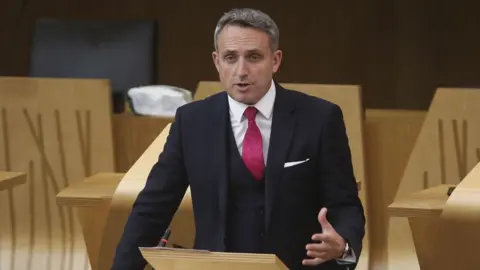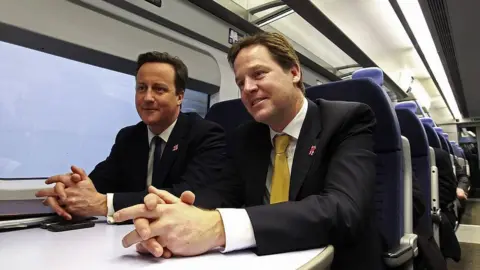Scottish Lib Dem leader's anxiety over council coalitions
 PA Media
PA MediaThe Scottish Liberal Democrat leader has said he has "significant anxieties" over his party entering local council coalitions with the SNP or Tories.
Alex Cole-Hamilton said the SNP and Conservatives were too focused on Scottish independence.
However, he said it would be up to local party leaders to decide whether to make formal alliances with them.
He insisted his party were not "tainted" by the 2010-15 UK government coalition with the Tories.
Speaking to BBC Radio's Good Morning Scotland, Mr Cole-Hamilton said: "I have significant anxieties about my council groups going into coalition with either the Conservatives or the SNP.
"The SNP's focus is not on local government - it's on independence. The Conservatives are part of the problem."
He also referred to the "partygate" scandal, and said it was evidence the Conservatives could not be trusted.
Boris Johnson is the first serving prime minister to be sanctioned for breaking the law, after he was fined for breaching lockdown rules. Chancellor Rishi Sunak was also fined.
'Forge common ground'
He said he would need to be persuaded that coalitions with either party would be in the best interest of the communities they were elected to serve.
Mr Cole-Hamilton said he, as Scottish leader of the Lib Dems, could not tell council group leaders what they could and could not do.
The Lib Dems were "not a command and control like you have with the SNP or to a certain extent the Conservative party".
He added: "I trust the local knowledge of my group leaders… I think they share my anxieties about the focus of the SNP and the focus of the Conservative party."
Currently the Lib Dems are working with the Conservatives on Angus and East Dunbartonshire councils.
But he said at local government level, independence and partygate were not on the table.
He said it was important to "forge common ground" to work together on issues like the rising cost of living, education recovery and insulating homes.
 Getty Images
Getty ImagesThe Scottish Lib Dem leader said the party was not tainted by the Westminster coalition between Nick Clegg's Lib Dems and David Cameron's Conservatives.
The Lib Dems were criticised for going back on their pledge to oppose raising tuition fees - with the limit in England being almost tripled under the coalition to £9,000.
The party was punished by voters in the 2015 election, losing 49 of its 57 seats.


There are still two weeks until polling day, but some attention is already turning to what will happen after the votes are counted.
The STV system used to elect councillors makes it difficult for any one party to win a majority. In 2017, the result of every mainland council election was No Overall Control.
So the reality of local politics is that if parties want to be in charge rather than sit on the sidelines, they need to band together. Either in formal coalitions, or working on an issue-by-issue basis as a minority administration.
In the last two council terms, almost every imaginable combination of parties has shared power.
This time round, a lot of talk seems to have focused on who parties don't want to work with.
It may well be that once the dust has settled, those elected will still thrash out deals under a slightly different name - perhaps, like the SNP and Greens at Holyrood, they could be cooperation agreements instead of coalitions.
But parties can take nothing for granted, and while they are still vying for votes the rhetoric is likely to focus on competition rather than consensus.

The SNP are in a power sharing arrangement at Holyrood with the pro-independence Scottish Greens.
A spokesman for the party said: "Unlike the Lib Dems, who have a habit of jumping into bed with them, the SNP will not be going into coalition with the Tories anywhere in Scotland."
The Scottish Conservatives said they would be willing to work at council level with pro-union parties to keep the SNP out of power.
Donald Cameron, the party's constitution spokesman, said the Tories would focus on local priorities rather than the constitution.
Scottish Labour leader Anas Sarwar said he opposed Labour councillors entering formal coalitions with the SNP and the Tories. However, this is a decision for Scottish Labour's ruling body.
After the last council election in 2017, nine Scottish Labour councillors were suspended by the party for forming a coalition with the Tories on Aberdeen City Council.
The Scottish Greens have said they will work constructively with other parties but this will be a decision for individual councillor groups.
However, a spokesman said the party would not join Conservative administrations because of the Tories' "denial of climate science and failure to tackle the cost of living crisis".
